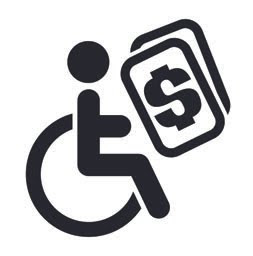
When you think about your insurance needs, you probably think about protecting your valuable assets, like your home and cars.
But what about your ability to earn? That’s an asset, too. What would happen if you lost the ability to earn a living?
Most of us aren’t in a financial position to be able to provide for ourselves and our loved ones if we could never work again. That’s where disability insurance comes in.
FAQ: Who Needs Disability Insurance?
Disability insurance is one of those policies that too many people overlook. I think more people pass over disability insurance than life insurance, but really, there’s a higher chance of being disabled on the job than dying.
If any of the following apply to you, you might need disability insurance:
- You have a job.
- You pay bills from the income you earn.
- You don’t have enough savings or retirement to cover those bills if you lose your job.
- You own a business with overhead expenses.
FAQ: What Is the Chance of Disability, How Long Does It Last, and What Does It Cost?
Almost 3 in 10 of today’s twenty-year-olds will become disabled before reaching age 67.
The average long-term disability absence is 2.5 years.
The average monthly Social Security Disability Insurance (SSDI) benefit is $1,064.
FAQ: What Do I Need to Know about Disability Insurance?
The jargon surrounding disability insurance can be confusing. Here’s a basic glossary to help you decipher your policy:
Benefit Amount: A disability insurance policy typically pays up to 80 percent of your monthly earnings prior to the start of the disability. The total amount of your benefit is limited to this amount, no matter how many disability insurance policies you carry.
Benefit Period: The benefit amount is paid for a specified period of time, such as five years, ten years, or until the beneficiary reaches a specific age, up to 65, which insurance companies reason is still the typical age for retirement.
Disability: Some policies define disability as inability to perform the duties of the occupation you are trained and qualified for. But other disability insurance policies say that if your skills translate to another position within your area of expertise, you are not disabled. For example, a surgeon may no longer be able to perform surgery, but he can teach at a university. One disability insurance policy may say the surgeon is disabled, while another disability policy says he isn’t. Other policies will pay only if you can’t work in any occupation, even if it’s not within your field of expertise.
Elimination/Waiting Period: This works like a deductible on auto insurance, except it’s in days, not dollars. Before long-term disability insurance benefits kick in, you have to wait a certain period of time, such as 30, 60, 90, 180, or 365 days. Sometimes, companies will also carry short-term disability policies that will reimburse you for lost wages before the long-term disability kicks in.
Inflation Protection: This addition to the policy allows benefits to increase every year based on an inflation index, usually the Cost-of-Living Adjustment (COLA). This could be an important provision to have as part of your policy, depending on the time between when the policy is purchased and when the claim is filed for benefits to be paid and for how long.
Partial Disability: If you are at least 20 percent disabled, the policy will pay the proportionate amount.
Portability: If you have access to a group policy, check to see if you are able to take it with you if you leave your job.
FAQ: How Do I Buy Disability Insurance?
If you are an employee for a large company, it probably has a plan with a short-term and/or long-term disability option. Typically, there is no underwriting, so you won’t have to answer questions about your health and age.
If you are self-employed, or if you work for a company but want to buy an individual policy, you have several options for disability insurance coverage. If you belong to a professional organization, it may have policies for members. You might also want to hire a trusted insurance professional or adviser who writes disability insurance for individuals.
If you are a business owner, you might want to explore several types of business insurance, including long-term and short-term disability, business overhead expense coverage (to protect your business from a forced liquidation), and workers’ compensation (a state-mandated coverage that provides for about two-thirds of an employee’s pre-disability income in the event of an accident on the job).
Work with your insurance agent to determine what policy type and size makes sense for your circumstances. Consider how much income you earn and whether you have outside financial resources that can help cover your expenses in case you are disabled.
National Disability Employment Awareness Month isn’t until October, but it’s never too soon to protect yourself as your greatest asset.
Linda Rey is a licensed insurance agent at Rey Insurance with a broad spectrum of expertise in life, accident, health, property and casualty insurance as well as retirement planning and college funding strategies.
Follow Linda on Twitter.
Flood Insurance: What to do Before, During and After a Flood






